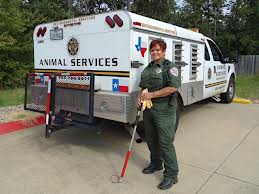How Easy is It to Be a Canine Officer

Animal control officers are responsible for responding to requests from the public to subdue wild critters and help animals that are otherwise in distress. The position used to be roundly regarded as a low-level job thought to require little or no skills. However, that view could not be further from the truth. These animal cops require plenty of training and experience to effectively diffuse potentially dangerous situations involving animal and human interactions. Their skills are taxed even more with the proliferation of exotic pets found within city limits. Here is an overview of the skills, training, and typical experiences faced by those in the animal control profession.
Required Skills of an Animal Control Officer
Animal control professionals must understand animal behavior to quickly assess situations involving animals and act to protect the public, themselves, and the associated animals. This ability to practically apply knowledge of all types of animals is a skill that is primarily learned and honed on the job. Additionally, those working in animal control must know how to use all the equipment at their disposal to do their jobs in the most humane way possible.
Animal control officers must possess excellent communication skills in addition to their animal psychology expertise. These canine catchers must effectively communicate with the public in the process of doing their jobs. Even after the animals are properly subdued and captured, officials within the criminal justice system often call upon animal control officers to testify in court cases that involve animals' antics against their human neighbors. In those cases, the animal control officers must know how to follow procedures, document their cases, and effectively communicate their findings to law enforcement officers and court officials.
Animal control officers also must possess certain medical knowledge that they apply when animals attack humans. This knowledge includes examining animal bites in humans as well as investigating injuries in animals. The skills possessed by these professionals become very important to humans that are bitten by wild animals infected with rabies.
Paths to Becoming an Animal Control Officer
Lead animal control officers in various cities and counties are appointed by mayors, city council members, or other city leaders. Depending on the size and population density of the city in which they work, these lead animal control officers do hands-on fieldwork otherwise they direct the operations of more junior level animal control workers. Animal control professionals are either employed directly with city or county governments or as contractors with the local government served. Job vacancy announcements for these positions often appear on city online career boards.
Most of the time these political appointments as animal control officers come as a result of the animal control officer's reputation gained through active involvement with organizations like People for the Ethical Treatment of Animals or the American Society for the Prevention of Cruelty to Animals. Some animal control professionals gain hands-on experience working with animals through internships at local farms. The privately operated National Animal Control Association advocates for new animal control officers to complete formal training on capturing and immobilizing animals humanely, and seasoned officers should continue on-the-job training.
Daily Life of an Animal Control Officer
Animal control officers see plenty of tragedy in their line of work, and it is probably not easy for them to constantly pick up animals that are destined to die at the city dog pounds mostly because the animals belong to irresponsible owners. However, the position can be quite rewarding especially when the officers help wildlife avoid deadly confrontations with humans. Additionally, the job can provide a number of smiles as well. As animal control officers receive calls from wealthy homeowners in the California hills about young black bears frequenting the hot tubs on their backyard decks, they probably cannot help but smile. Also, the humorous account of a military police (MP) officer's encounter with a giant snapping turtle reminds everyone that animal control should definitely be left to those with professional training. As the story goes, no animal control officer was available in this remote military-operated area. A large snapping turtle found its way to the middle of a busy thoroughfare and would not move. Base traffic began to get heavy because people did not want to hit the turtle. After a while, one of the MPs on duty decided that he was tired of waiting for the turtle to move and started prodding the critter with his nightstick. He managed to get the turtle to move across the street and onto a grassy area. Just when the turtle was about to reach the grassy area, it quickly snapped the MP's nightstick and spitefully walked off with it in its mouth.
Expected Job Outlook for Animal Control Officers
As urban environments continue to encroach upon land that native wildlife traditionally call home, animal control officers will keep playing active roles in the community. According to the Bureau of Labor Statistics, these animal care service workers have bright employment prospects through 2020 as job growth in their profession is projected as 23% higher than the average growth rates for other jobs.
RELATED:
HOW DO I BECOME A NCIS AGENT?
IMMIGRATION AND CUSTOMS ENFORCEMENT: EDUCATION AND RESPONSIBILITIES
HOW DO I BECOME A DEA AGENT?
BECOME A SECRET SERVICE AGENT?
HOW DO I BECOME A CIA AGENT?
Source: https://www.criminaljusticedegreehub.com/how-do-i-become-an-animal-control-officer/
0 Response to "How Easy is It to Be a Canine Officer"
Post a Comment